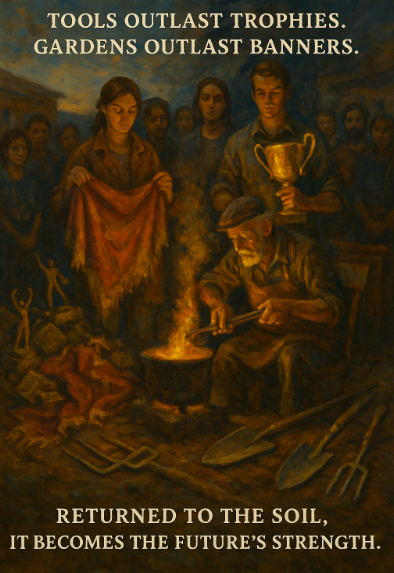
The wreckage lay in a heap at the courtyard’s edge: the warped plywood skeleton of Lara’s banner, its gold fabric clinging in tatters; Marco’s trophies, their plastic champions frozen in hollow triumph; splintered library shelves and broken chairs. It was a monument to what had collapsed, a shrine to victories that no longer fed anyone.
Students passed by with glances, some bitter, some wistful. It was Leo who said what all were thinking. “This isn’t history. It’s compost waiting to happen.”
Marco stiffened, his arms folded across his chest. “These are trophies. Records. Proof of what we achieved.” His voice cracked with something between anger and desperation. “You don’t just melt down history.”
Lara emerged from the greenhouse, sleeves rolled, soil still under her fingernails. She stopped before the pile. Her eyes lingered on a dented trophy, the figure reaching forever for a ball. She picked it up, turning it over in her hands. “This,” she said quietly, “is not history. It’s sentiment. A memory of one moment.” She placed it back onto the pile, the sound of plastic tapping plastic. Her gaze lifted toward the greenhouse where Aisha stitched torn canvas and Mateo measured a new pane of glass. “What they are doing in there—that is history. Repair. Renewal. If these things can be broken down and given new use, then they mean more than they ever did shining on a shelf.”
The courtyard hushed. Marco looked as though she had struck him, but he did not reply.
Grandfather appeared then, steadying himself with his stick, his hands carrying not a hammer but a small, blackened crucible—an old forge. He set it down beside the pile and crouched low with a grunt. “Pride,” he said, his voice even, “makes poor compost. But humility?” He picked up a strip of gold fabric, shredded and damp. “Humility can be melted down. It can be reformed. It can feed a thousand new roots.”
He did not ask permission. He fed the strip of fabric into the crucible’s fire. The edges curled, blackened, then slumped into molten glow. The students watched in silence, drawn not to spectacle but to the inevitability of the act.
Mateo stepped forward with a crude sand mold carved for a trowel. Grandfather tipped the crucible, and a thin stream of glowing metal hissed into the waiting shape. When the mold broke open, a rough, uneven blade lay within—not a symbol, but a tool.
That was the signal. Slowly, almost reverently, students began adding pieces of the wreckage. A plaque became a hinge. A brass nameplate from the council’s door became a latch for the greenhouse frame. One by one, Marco’s trophies followed. He held the last one a long time, thumb rubbing the worn edge of its base, then placed it into the fire. His shoulders sank, not in defeat but in release.
By dusk, the pile was gone. In its place lay a neat row of tools—awkward, imperfect, but undeniably useful.
Lara lifted the first trowel, its metal still warm. She turned it in her hand, and for the first time since her election, her expression held no triumph, no performance.
It felt like balance. It felt like a beginning.
Back in the greenhouse, Priya opened the ledger. Her pen hovered for a moment before she found the right words. She wrote not of destruction, but of transformation:
“The Great Alchemy, 4/18. From wreckage into use. A trowel from a trophy. A hinge from a plaque. A new purpose from old pride.”
Outside, the first star appeared in the violet sky. The compost of the old system had been turned, and from it, the first true shoots of a new order were ready to break ground.
The fortress had not only fallen.
It had been composted into a garden.

